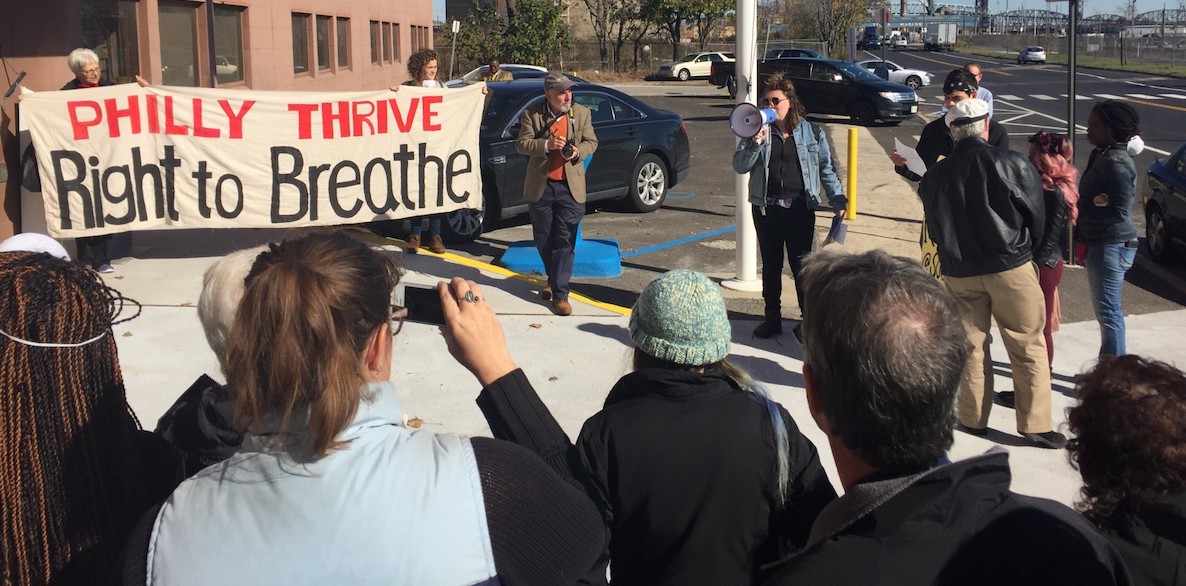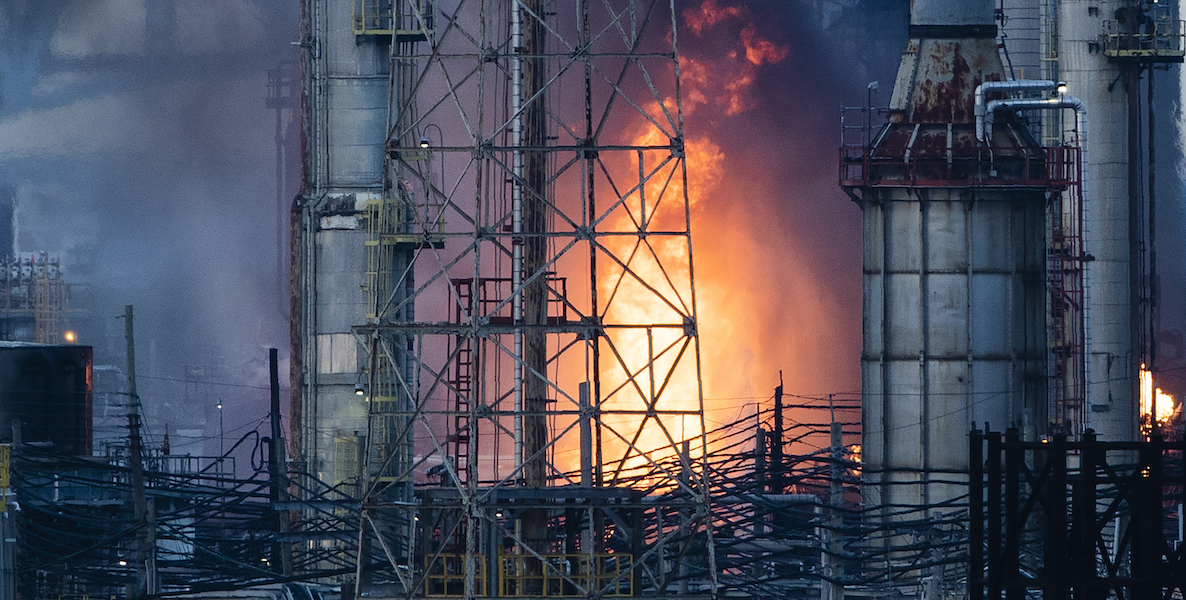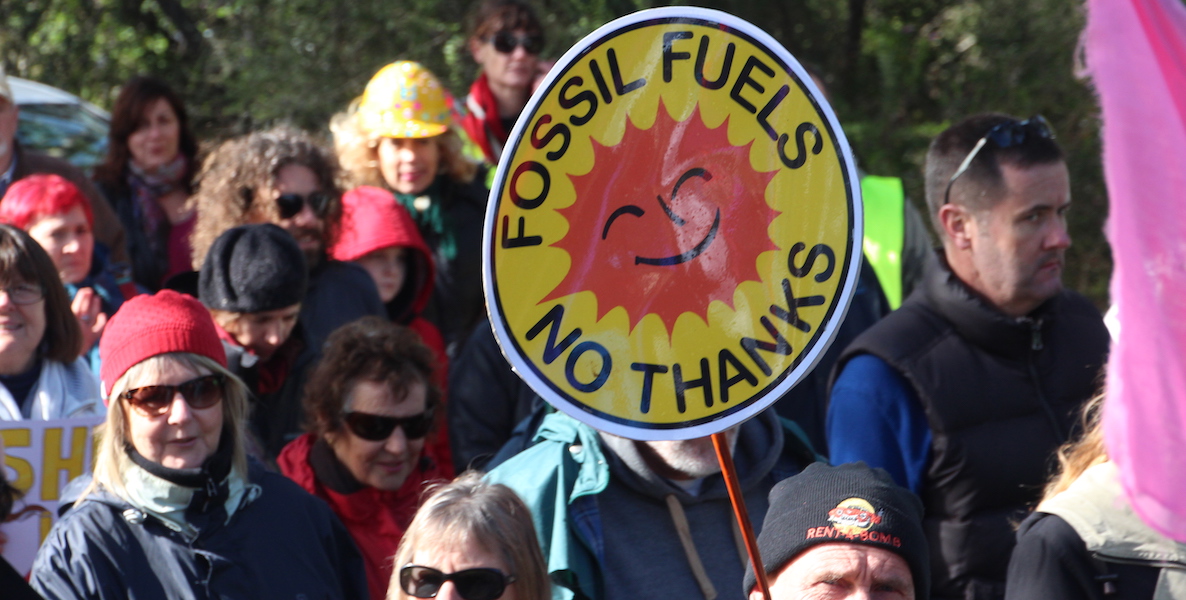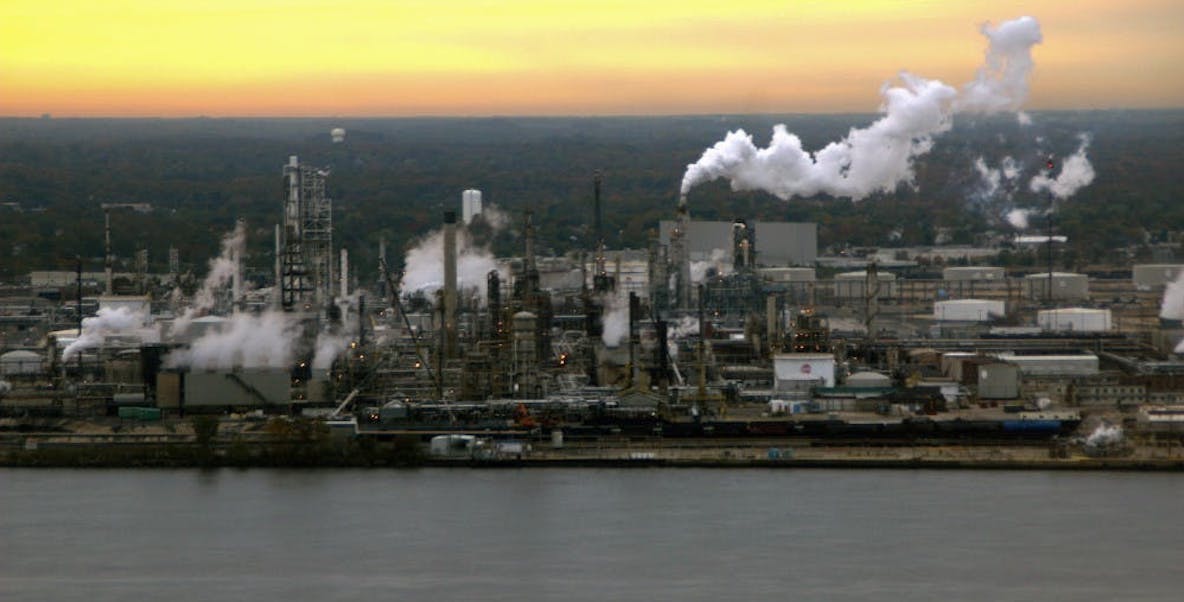Philly Thrive activists, filling up seats in yellow shirts along the red velvet carpeting of Philadelphia City Council’s main chamber Thursday, felt a bit cheated. What had originally started out as a much more strongly worded resolution on the future of the shuttered Philadelphia Energy Solutions (PES) refinery site—authored by outgoing Councilwoman Blondell Reynolds-Brown—ended up watered down and ambiguous.
![]() What was needed was something much more muscular and strongly worded – something that said, unwaveringly, that the Council wants no bidding of any kind proposing reinstituted fossil fuel use of the site. An ordinance, something with actual regulatory teeth to do something, would have been preferred. But, instead, advocates got the soft sense of the Council, a powerless resolution on a very powerful matter that would simply offer “strong interest” in and “enthusiastic support” of bids “aligned” with the city’s Clean Energy goals. Not all that particularly satisfied (and who could blame them), Philly Thrive members stormed from City Council chambers to the Mayor’s office demanding a meet up in the immediate future. (The deputy City Manager set a date for early December.)
What was needed was something much more muscular and strongly worded – something that said, unwaveringly, that the Council wants no bidding of any kind proposing reinstituted fossil fuel use of the site. An ordinance, something with actual regulatory teeth to do something, would have been preferred. But, instead, advocates got the soft sense of the Council, a powerless resolution on a very powerful matter that would simply offer “strong interest” in and “enthusiastic support” of bids “aligned” with the city’s Clean Energy goals. Not all that particularly satisfied (and who could blame them), Philly Thrive members stormed from City Council chambers to the Mayor’s office demanding a meet up in the immediate future. (The deputy City Manager set a date for early December.)
![]() As Council itself noted, the PES refinery is “the largest stationary source of toxic air pollution in Philadelphia and the city’s single-largest industrial contributor of greenhouse gases”—and that was before the June 21 explosion that could have been a deadly toxic event for the residents in Southwest Philly. So, if you know that, why a resolution versus an ordinance? Or: why not an ordinance directing the city’s Public Health department to start assessing the real toll on resident health so we officially know how bad it’s been? Friday was the deadline for bidders to submit proposals to qualify for the process to be selected as new operators of the 150-year-old site—and, potentially, bring back the more than 1,000 jobs lost over the summer.
As Council itself noted, the PES refinery is “the largest stationary source of toxic air pollution in Philadelphia and the city’s single-largest industrial contributor of greenhouse gases”—and that was before the June 21 explosion that could have been a deadly toxic event for the residents in Southwest Philly. So, if you know that, why a resolution versus an ordinance? Or: why not an ordinance directing the city’s Public Health department to start assessing the real toll on resident health so we officially know how bad it’s been? Friday was the deadline for bidders to submit proposals to qualify for the process to be selected as new operators of the 150-year-old site—and, potentially, bring back the more than 1,000 jobs lost over the summer.
City Hall, along with relevant regulatory and city public health agencies, have shown little interest in exploring or examining the actual cost of that site in terms of the deteriorating health of residents and the many lives lost over generations as a result.
But it’s bizarre how City Hall has just folded in the process. City and state elected officials keep saying they’re powerless to do anything beyond what they’re already doing—and that’s not much. City Hall, along with relevant regulatory and city public health agencies—despite their much-touted clean energy plans—have shown little interest in exploring or examining the actual cost of that site in terms of the deteriorating health of residents and, potentially, the lives lost over generations as a result. PhillyThrive did conduct a 2017 survey of residents living around the refinery, assessing their health and found nearly 53 percent claimed some form of “… asthma, heart disease, cancer, or another respiratory condition.” But, that was more anecdotal polling sample than the government-sponsored full-blown epidemiological study confirming the direct link.
What we are certain of is that the Mayor, along with City Council and others, are playing an obfuscating game of three card monte. One moving card on the left hand moves erratically as the player deviously grins to suggest they’re completely with you: Don’t worry, says City Hall, we get it, we’re on your side. But the other cards on the right hand moving in blurry circular motions shows us a much different play designed to leave city residents both confused and, literally, sick.
Philadelphia’s elected class talks a very “greener than thou” the-future-is-clean-energy game—and that looks glossy on a brochure or a future Mayoral candidate’s resume. But they haven’t started walking like that, yet. City Hall, ![]() Mayor and City Council, will not move ambitiously or urgently in that direction, especially given the condensed 10-year timeline toward climate crisis event horizon. It’s unclear why because there is plenty of public support for aggressive action. Neither is the delegation to Harrisburg applying pressure, and just constantly raises its hands in futility while pointing to partisan logjam. Signs of a hotter, stuffier, much more flooded Philly region are already here, along with unhealthy air and water that disproportionately afflicts the area’s least financially fortified.
Mayor and City Council, will not move ambitiously or urgently in that direction, especially given the condensed 10-year timeline toward climate crisis event horizon. It’s unclear why because there is plenty of public support for aggressive action. Neither is the delegation to Harrisburg applying pressure, and just constantly raises its hands in futility while pointing to partisan logjam. Signs of a hotter, stuffier, much more flooded Philly region are already here, along with unhealthy air and water that disproportionately afflicts the area’s least financially fortified.
A non-binding, toothless resolution whereby Council expresses its desire is still a toothless resolution. What’s needed is an ordinance or law that simply mandates “enough is enough.” Or: simply exercise the regulatory tools you’ve got. If Philly really wants itself running completely 100 percent clean energy by 2050, well then don’t expect to get there by allowing certain interests—whether it’s the PES refinery bidders or SEPTA or Philadelphia Gas Works (PGW) —to build additional natural gas platforms. And don’t expect to get there without putting up a fight.
The Mayor can’t reasonably globetrot, sign on to symbolic multi-city climate agreements, shade Trump, and skip across the country showcasing himself as Mr. Jolly Green New Deal when he’s allowing the build-out of methane-blasting natural gas plants in North and Southwest Philly. That fits the classic definition of environmental racism. Neither can he do all this and remain annoyingly coy about the future of the refinery site. Either Philly wants clean, safer and equitable energy solutions or it really doesn’t.
If City Hall was really serious about keeping future natural gas production off that site, both Mayor and City Council would have long ago teamed up and used every possible tool at their disposal to make the bankruptcy and bidding process reflect those clean energy values.
The Mayor can’t reasonably globetrot, sign on to symbolic multi-city climate agreements, shade Trump, and skip across the country showcasing himself as Mr. Jolly Green New Deal when he’s allowing the build-out of methane-blasting natural gas plants in North and Southwest Philly.
That’s what happened a couple of months ago in the Chicago suburb of Willowbrook, Illinois where small cities teamed up with outraged residents against chemical polluter Sterigenics. The company had been fumigating its facilities with a harmful toxic gas for decades; when residents found out, they became overnight activists forcing the village mayor, sister towns and area state legislators to threaten Sterigenics with all sorts of legal, legislative and regulatory weapons. The pressure was so intense that, in September, Sterigenics announced it’s leaving.
It’s unclear where Sterigenics will go next—one worries if they’ll end up in a Chicago neighborhood that’s much less predominantly White and more vulnerable than the previous one. But, the point is: we’re not seeing that level of concern, outrage and willing collaboration from city and state leaders in Philadelphia on the subject of PES. Instead, we’re seeing flashes of irritation and rushed patronizing of protesters—the passage of the resolution wasn’t viewed as sincere, it was more like “oh, alright, here, we did something, so now please just go away and shut the f**k up!” If City Hall was really serious, it would act more like that Illinois suburb. But who knows: maybe they would be acting differently if Philly, particularly the ailing South Philly communities neighboring the refinery site, was as White as Willowbrook, Illinois. When there’s too many low-income Black people affected, it’s always too much work or impossible to respond.
Which is why it’s reasonable to ask: why isn’t Philly using eminent domain in this situation?
No one has brought up the possibility of Philly exercising eminent domain, a tool it’s been more than happy to use when it needs to raze ground for residential and commercial real estate developers. Just ask residents pushed out of the Sharswood section and Mantua’s James Dupree. Activation of eminent domain on the PES site would have been the perfect moment. Yet, in this case, it’s downright bizarre and malfeasant that City Hall hasn’t considered or even mentioned the possibility of it.
Yet, eminent domain to fight environmental injustice was exactly what happened just two-and-a-half hours away in Washington, D.C …in a majority Black neighborhood. When Northeast D.C. residents got too fed up with a smelly, polluting trash transfer station that had impacted their neighborhood for years, their Black city council member not only studied and pushed for closure, but the Mayor, along with the D.C. City Council, proposed and passed eminent domain. That was just last year.
If a large city like D.C. can do it, creating a situation where residents, the City Council and the Mayor jumped on the same page and exercised a variety of policy options, what exactly is going on with Philly?
![]() New York City-based environmental activist Aaron Eisenberg floats eminent domain as “an existing legal mechanism to control and limit the extraction of destructive fossil fuels.” A federal Justice Department memo notes that eminent domain has been used before to “… establish parks … setting aside open space for future generations, preserving places of historic interest and remarkable natural beauty, and protecting environmentally sensitive areas. Some of the earliest federal government acquisitions for parkland were made at the end of the nineteenth century and remain among the most beloved and well-used of American parks.” So, it’s not like it hasn’t been used as an active conservation tool. And maybe it’s time to use it for something that’s virtually non-racist and planet-saving versus the racist way it’s been used in the past.
New York City-based environmental activist Aaron Eisenberg floats eminent domain as “an existing legal mechanism to control and limit the extraction of destructive fossil fuels.” A federal Justice Department memo notes that eminent domain has been used before to “… establish parks … setting aside open space for future generations, preserving places of historic interest and remarkable natural beauty, and protecting environmentally sensitive areas. Some of the earliest federal government acquisitions for parkland were made at the end of the nineteenth century and remain among the most beloved and well-used of American parks.” So, it’s not like it hasn’t been used as an active conservation tool. And maybe it’s time to use it for something that’s virtually non-racist and planet-saving versus the racist way it’s been used in the past.
Residents concerned about the expansion of natural gas throughout a city already suffering from it will need to get much more creative when demanding action from City Hall. Environmental advocacy groups like Philly Thrive and other city residents might want to push for the immediate pursuit of eminent domain. Perhaps it’s time to make a stop by the City Solicitor’s office and ask about it. Ideally, the city pursues it, perhaps applies enough pressure to eliminate natural gas bidders, and comes up with the money to purchase that land at “fair market value”—keep in mind, the city should get it for cheap since it’s already damaged and polluted (so said the Supreme Court). Recent episodes in other major urban locations show us it’s not an unusual move. Apparently, however, in a place as cold as Philly, it is.
Charles D. Ellison is Executive Producer and Host of “Reality Check,” which airs Monday-Thursday, 4-7 p.m. on WURD Radio (96.1FM/900AM). Check out The Citizen’s weekly segment on his show every Tuesday at 6 p.m. Ellison is also Principal of B|E Strategy, catch him if you can @ellisonreport on Twitter.
Photo by Doc Searls







